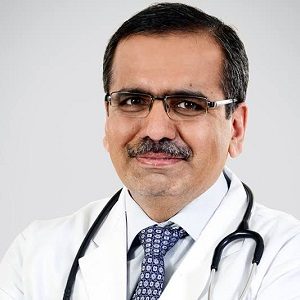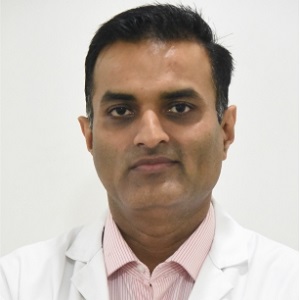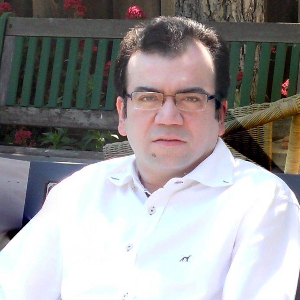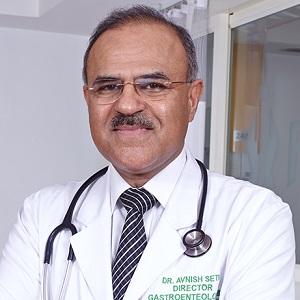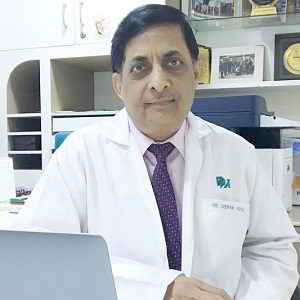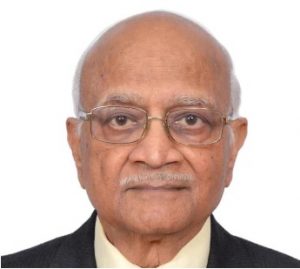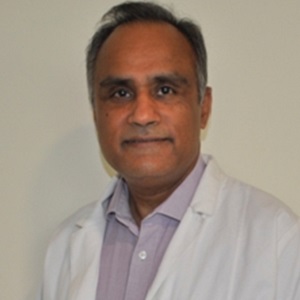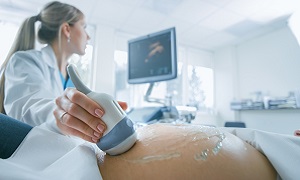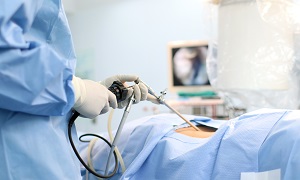Best Appendicitis Treatment Doctors in India
- Medical Gastroenterologist and Hepatologist, New Delhi, India
- Over 30 years experience
Profile Highlights:
- Dr. Yogesh Batra is one of the best medical gastroenterologists in New Delhi, India.
- Dr. Batra specializes in therapeutic endoscopy (EUS, ERCP), hepatology, pancreatic disease, and inflammatory bowel disease (IBD). He has successfully performed a variety of diagnostic and therapeutic GI procedures on hundreds of patients throughout his career.
- Gastroenterologist, Gurugram, India
- Over 15 years’ experience
Profile Highlights:
- Dr. Pawan Rawal continued to work in PGIMER, Chandigarh after completing his DM for the next few years and gained proficiency in clinical Gastroenterology, Hepatology, and its application to patient care.
- He has performed several adults and pediatric upper G I endoscopies/ colonoscopies, ERCPs, capsule endoscopies, and push and double-balloon enteroscopy. Dr. Pawan Rawal is quite experienced in performing all kinds of therapeutic procedures.
- Liver Transplant Surgeon and HPB Surgeon, New Delhi, India
- Over 33 years’ experience
Profile Highlights:
- Dr. Subhash Gupta is one of the finest Gastrointestinal and Liver Transplant Surgeons in the country. He has garnered an outstanding reputation in the field of Biliary, pancreas, and liver transplantation.
- He has conducted over 300 Living Donor Liver Transplants in the year 2013 each lasting 10-16 hours long.
- Dr. Subhash Gupta is also known to pioneer the development of Living Donor Transplant or LDLT.
- Gastroenterologist, New Delhi, India
- Over 27 years’ experience
Profile Highlights:
- Dr. Avnish Kumar Seth is a well-renowned name in the field of gastroenterology. With fellowships in Liver transplant (Birmingham, UK) and Endoscopic ultrasound (South Carolina Alabama, USA), Dr. Avnish Seth’s areas of interest include treatment of hepatitis B, Hepatitis C, liver transplantation, and advanced GI endoscopic procedures.
- Dr. Avnish Kumar Seth has over two decades of experience in Gastroenterology Hepatobiliary Sciences. An expert in Diagnostic Therapeutic GI Endoscopy, Colonoscopy, ERCP, and Liver Transplantation.
- Surgical Gastroenterologist, New Delhi, India
- Over 29 years experience
Profile Highlights:
- Dr. Deepak Govil is one of the best Surgical Gastroenterologists in India, having over 29 years of experience in GI procedures. He has worked as a senior Gastro and laparoscopic surgeon at Indraprastha Apollo Hospitals.
- Dr. Govil, the founder of PSRI’s Department of GI Surgery, has done a lot of significant GI surgical interventions.
- He is well-known for having done liver transplants upon living donors. At Apollo Hospital, he has performed over 2000 surgeries that include the liver, gastrointestinal tract, and laparoscopic procedures.
- In addition to his fieldwork, Dr. Govil has taught at prestigious medical institutes in Delhi.
- Medical Gastroenterologist, New Delhi, India
- Over 45 years’ experience
Profile Highlights:
- Dr. D K Bhargava is a Medical Gastroenterologist working at Indraprastha Apollo Hospitals, New Delhi.
- He has 45 years of experience in his field.
- Dr. Bhargava was a Professor of Gastroenterology at the All India Institute of Medical Sciences, New Delhi formerly.
- Some of the services he provides are Colonoscopy, Gastroenteritis Treatment, Acidity Treatment, and Irritable Bowel Syndrome Treatment.
- Exceptionally qualified Dr. D K Bhargava has received the Padma Shri Award and Dr. B C Roy National Award from the President of India.
- He has published more than 150 articles, papers, and journals throughout his career.
- He is a member of the American Gastroenterological Association, Indian Society of Gastroenterology and American College of Gastroenterology.
- Pediatric Gastroenterologist, New Delhi, India
- Over 26 years’ experience
Profile Highlights:
- Dr. Anupam Sibal is one of the best Pediatric Gastroenterologists in Delhi, having nearly 26 years of experience in treating GI and liver disorders.
- He is a senior consultant for Pediatric Gastroenterology and Hepatology at Indraprastha Apollo Hospital, Delhi. Additionally, he is working as Group Medical Director of Apollo Hospitals.
- He has expertise in Congenital Disorders Evaluation & Treatment, Growth & Development Management, injuries in children, and complete Paediatric health checkups.
- Dr. Sibal went for International certifications and training to improvise.
- Dr. Sibal won many National and International Awards for his excellent work.
- Besides authoring 99 medical writing Dr. Sibal has written a bestselling book, “Is Your Child Ready to Face the World?” and edited/proofread a textbook on Gastroenterology & Hepatology.
- Liver Transplant Surgeon & HPB Surgeon, Gurugram, India
- Over 15 years’ experience
Profile Highlights:
- Dr. Giriraj Singh Bora is a liver transplant surgeon, who is known for being the founder member of the Liver Transplant Society of India.
- He is the first doctor to transplant a liver in Rajasthan. He is also known for carrying out the first deceased donor and the first living donor liver transplants in Rajasthan and has also been instrumental in starting a liver transplant program in the region.
- Gastroenterologist, New Delhi, India
- Over 20 years’ experience
Profile Highlights:
- Dr. Vivek Raj is a well-known Gastroenterologist with a clinical experience of 20 years in the field.
- His medical interests are managing ERCP, Liver Diseases, and Colonoscopy.
- He is a member of various renowned organizations.
- Gastroenterologist, Gurugram, India
- Over 30 years’ experience
Profile Highlights:
- Dr. Gourdas Choudhuri is a gastroenterologist, medical educator, researcher of national eminence, as well as a columnist and philanthropist.
- He completed his training at the All India Institute of Medical Sciences in New Delhi and was the first specialist to start Endoscopic Ultrasound (EUS) and Extra Corporeal Shockwave Biliary Lithotripsy (ESWL) in India.
- It was under Dr. Gourdas Choudhuri’s expert leadership and supervision the prestigious department of Gastroenterology at Sanjay Gandhi PostgraduateInstitute of Medical Sciences, Lucknow, developed into one of the top five in the country.
Best Appendicitis Treatment Hospitals in India.
Indraprastha Apollo Hospital, New Delhi
- City: New Delhi, India
Hospital Highlights:
- Indraprastha Apollo Hospital is a 700-bedded multispecialty hospital in the heart of the capital of India. It is a part of Apollo Hospital group, one of India’s most reputed healthcare chains. Indraprastha Apollo Hospital has been accredited by Joint Commission International, making it the first internationally accredited hospital in the country in 2005.
- There are 52 specialties in the hospital with one of the best cardiology centers in the country. The hospital is also equipped with State of the art infrastructure facilities with the largest Sleep Lab in Asia and the largest number of ICU bed facilities in India.
- The hospital also has one of the largest dialysis units in India along with a dedicated Bone Marrow Transplant unit.
- The latest and highly advanced technologies that are installed in the hospital include Da Vinci Robotic Surgery System, PET-MR, PET-CT, Cobalt-based HDR Brachytherapy, Brain Lab Navigation System, Tilting MRI, Portable CT scanner, 3 Tesla MRI, 128 Slice CT scanner, DSA Lab, Endosonography, Hyperbaric Chamber and Fibro scan.
Fortis Memorial Research Institute, Gurugram
- City: Gurugram, India
Hospital Highlights:
- Fortis Memorial Research Institute is a multi-super-specialty, quaternary care hospital with 1000 beds. The hospital comprises reputed clinicians, and international faculty and is also equipped with cutting-edge technology. The hospital is a part of Fortis Healthcare Limited, a reputed chain of private hospitals in India.
- It is a NABH-accredited hospital that is spread across 11 acres of land and has a capacity of 1000 beds. The hospital has 55 specialties and is one of the premier health care centers in the Asia Pacific region popularly known as “the Mecca of Healthcare”.
- The hospital has 260 diagnostic centers and is also equipped with the latest and advanced techniques that include 3 Telsa which is the world’s first Digital MRI technology. The hospital also has world-class Radiation Therapy techniques which have been developed by leading technology experts from Elekta and Brain Lab.
Apollo Hospital, Chennai
- City: Chennai, India
Hospital Highlights:
- Apollo Hospitals, Chennai, is one of the best hospitals for heart care in India. Over the years, Apollo has expanded all over India, as a healthcare chain.
- India’s first ‘Only Pancreas’ transplant was performed in Apollo Hospital. The hospital is known for successfully performing Asia’s first en-bloc combined heart and liver transplant, and over the years, it has attained a remarkable achievement in the global healthcare space. Around 3-4 organ transplants are performed in the hospital per day.
- Equipped with over 500 beds, this hospital in Chennai was established in 1983 and since then has been among the most preferred hospital for patients from all over the world.
- The hospital holds accreditation of the NABH and JCI and is the first hospital in India to be ISO 9001 and ISO 14001 certified. It is also the first South Indian Hospital to receive subsequent reaccreditation from the JCI USA 4 times.
Medanta-The Medicity, Gurgaon
- City: Gurugram, India
Hospital Highlights:
- One of India’s best and largest multi-specialty hospitals, Medanta was built with the aim to bring India to the highest standards of medical care. The hospital has been providing the best medical services to its patients, since its inception, with care, commitment, and compassion.
- Equipped with 1250 beds, the hospital was founded by Dr. Naresh Trehan in the year 2009 with an aim to provide the best medical care at affordable costs. The hospital is spread across 43 acres and includes 45 operation theatres and 350 beds dedicated solely to ICU. The hospital includes over 800 doctors, and more than 22 specialty departments and has a dedicated floor for individual specialty in order to offer the best services under one roof.
- The hospital is considered one of the premier institutes in India for Cardiac Care and includes staffs and members of high caliber. The hospital has 6 distinct centers of excellence.
Max Super Specialty Hospital, New Delhi
- City: New Delhi, India
Hospital Highlights:
- One of the well-regarded providers in India committed to the highest standards of clinical excellence and patient care, Max Super Specialty Hospital is a part of Max Healthcare, which is the second-largest healthcare chain in India. Regarded as one of the most well-regarded healthcare providers in the country, Max Super Specialty Hospital is committed to the highest standards of clinical excellence as well as patient care. The hospital is also equipped with the latest technology as well as cutting-edge research. The hospital is known to deliver and ensure the highest level of patient care.
- The hospital has more than 500 beds and offers treatment for over 35 specialties. The hospital also holds the credit of having installed the first Brain Suite in Asia. This is a highly advanced Neurosurgical machine that allows MRI to be taken while surgery is ongoing.
- Other advanced and latest technologies are also installed in the hospital such as the 1.5 Tesla MRI machine, 64 Slice CT Angiography, 4D ECHO, LINAC, and 3.5T MRI machine.
Artemis Hospital, Gurugram
- City: Gurugram, India
Hospital Highlights:
- One of the most well-known hospitals in the Delhi NCR, Artemis Hospital is the first hospital in Gurugram to get accredited by the Joint Commission International.
- With more than 40 specialties, the hospital has been designed to be one of the most technically advanced hospitals in the country, with the best medical and surgical health care. The hospital has eleven special and dedicated centers, for Heart, Cancer, Neurosciences, etc.
- The latest technologies in the hospital include Endovascular Hybrid Operating Suite and Flat panel Cath Labs for the cardiovascular department, 3 Tesla MRI, 16 slice PET CT, 64 Slice Cardiac CT Scan, HDR Brachytherapy, and highly advanced Image Guided Radiation Therapy techniques (LINAC) are installed in the hospital.
- The hospital has won several awards as well, since its inception.
BLK Max Super Specialty Hospital, New Delhi
- City: New Delhi, India
Hospital Highlights:
- Equipped with 650 beds, BLK Superspecialty Hospital is the largest stand-alone private sector hospital in Delhi.
- With over 1500 healthcare providers and 150 globally renowned super specialists, the hospital is one of Asia’s largest Bone Marrow Transplant Centres. The hospital is known for having some of the best cancer doctors in the country.
- The hospital is NABH and NABL accredited and was inaugurated by the first Prime Minister of India. Pt. Jawahar Lal Nehru.
Gleneagles Global Hospitals, Chennai
- City: Chennai, India
Hospital Highlights:
- Established in 1999, Gleneagles Global Hospital, Chennai, is one of the top healthcare facilities in Southern India. It is part of the Gleneagles Hospital Chain, which is the fourth largest healthcare chain in the country. The hospital specializes in multi-organ transplants of kidneys, liver, lungs, heart, etc.
- The hospital has an excellent infrastructure and state-of-the-art lab and equipment set-up. The hospital boasts cutting-edge technologies, a highly skilled team of doctors and surgeons, and trained support staff. Located in Perumbakam, Chennai, it is one of India’s premier health care destinations. The hospital has performed some of the most complex surgical and clinical procedures in India including multi-organ transplantations.
- The hospital’s lung transplantation program is one of the best in the country. The hospital is known for having performed India’s first single lung transplant and first minimal invasive lung transplant. It is also the only Indian hospital to be associated with King’s College Hospital, London, United Kingdom for liver transplantations.
Fortis Hospital, Mulund, Mumbai
- City: Mumbai, India
Hospital Highlights:
- Fortis Hospital in Mulund is a 315-bed multi-speciality tertiary care hospital with five JCI accreditations that offers a wide variety of diagnostic and therapeutic services. The Fortis Hospital in Mulund delivers patient-centred treatment with cutting-edge technology, highly skilled and experienced surgeons, and paramedical staff.
- This institution houses Maharashtra’s largest multi-organ transplant centre. It is also the first heart transplant centre in western India to conduct 100 or more consecutive heart transplants in under four years. It is the only hospital in the city to have multi-organ transplants and has handled the youngest patient for angioplasty. Fortis Hospital Mulund now boasts the first advanced surgical robot in central Mumbai.
- Cardiology and heart surgery, urology, nephrology, neurosciences, orthopaedics, digestive care, emergency and critical care, and maternity care are among the services provided by the hospital.
Kokilaben Dhirubhai Ambani Hospital, Mumbai
- City: Mumbai, India
Hospital Highlights:
- Kokilaben Dhirubhai Ambani Hospital, Named after the wife of Indian industrialist Dhirubhai Ambani, the founder of Reliance Industries, this is one of the top hospitals in Mumbai. This 750-bed multi-specialty hospital became operational in 2009. Known as one of India’s most advanced tertiary care facilities, the hospital is designed to raise India’s global standing as a healthcare hub, with an emphasis on excellence in clinical services.
- Kokilaben Dhirubhai Ambani Hospital uses Protocol and Care Pathway based treatment models to ensure the best outcomes for patients.
- The hospital represents a confluence of top-notch talent, cutting-edge technology, state-of-the-art infrastructure, and, most importantly commitment.
- The hospital also holds the accreditation of the NABH, NABL, CAP, and JCI.
- The hospital has been recognized as the No. 1 Multispecialty Hospital in Mumbai and the West Zone for the fifth year in a row in 2020 by The Week.
What is Appendicitis?
Appendicitis is a medical condition in which there is an inflammation of the Appendix. The Appendix is a finger-shaped pouch that projects from the colon on the right side of our abdomen.
Patients with appendicitis experience pain in lower abdomen. The pain generally begins around the navel and progresses. The pain becomes intense as the inflammation worsens.
Appendicitis generally occurs in the age group 10-30, but can happen at other ages also.
Types of Appendicitis
The two common types of Appendicitis are:
- Acute Appendicitis – Acute Appendicitis appears suddenly and can be severe in nature. Acute appendicitis requires instant/ immediate medical attention and is actually more common than chronic appendicitis
- Chronic Appendicitis – In Chronic Appendicitis, the symptoms are mild and progressive in nature and may come and go from time to time. This type of appendicitis can be hard to diagnose and may only be detected if it turns into acute appendicitis.
Possible complications of untreated Appendicitis
An untreated appendicitis is much more dangerous as it can burst and cause a nasty bacterial spill in your gut and larger intestine which is actually quite dangerous.
But hopefully, you don’t have to wait around waiting for your appendix to rupture, especially if you know everything about the common appendicitis symptoms and most importantly the cause.
Causes of Appendicitis
Although we are yet to determine the exact cause of appendicitis, here’s what doctors and medical practitioners have narrowed down the most probable causes leading to this condition.
Appendicitis primarily develops when a part of the appendix gets blocked or obstructed by any object inside the body. The object can be anything from-
● Intestinal worms
● Hardened stool
● Physical trauma
● Certain foreign body
● Cancer (Rare but possible)
Symptoms of Appendicitis
The most common appendicitis symptoms would include:
- Pain in the navel region (above or below)
- Pain in the lower right abdominal area
- Recurring indigestion
- Nausea (maybe accompanied by vomiting)
- Appetite loss
- Diarrhea / constipation
- Bloating or abdominal swelling
- Mild fever
Appendicitis pain starts off mild much like cramps but would eventually grow more and more intense with time. Also, the initial source of the pain keeps changing with time moving from the upper abdomen to the lower right section of your abdomen.
Diagnosis of Appendicitis
Following are some of the diagnostic tests for Appendicitis.
- CT scan / MRI / X-Ray
- Ultrasound
- Complete Blood Count or CBC Test
- Urine test (to determine presence of infection)
- Rectal test
- Physical exams (to access pain, inflammation, discomfort level)
Appendicitis Treatment
Based on your age, severity, and other variables; you doctor may suggest some non-invasive treatment methods such as- antibiotics, pain relievers, liquid diet etc.
However, in most of the appendicitis cases, a surgery is the best option for a complete cure and the surgery most commonly practiced for it is known as Appendectomy. This standard form of treatment eliminates not just the inflamed organ but probable safety hazard risks such as appendix rupture too.
Appendicitis Surgery
The two primary invasive treatment methods thus include:
Appendectomy
Appendectomy is an open surgery where a small incision is made to surgically remove the inflamed appendix. However, laparoscopic surgery options are becoming more and more common these days where small surgical tools are inserted along with a minute video camera to surgically remove the appendix. The recovery time for this procedure is usually fast with almost 90% success rate.
Abscess Drainage
Appendicitis Surgery- things you need to remember
- If your medical practitioner recommends surgical intervention, please disclose your full medical history (along with existing or current medication routine) before the surgery.
- Your doctor may request you to follow a certain diet which may include liquids, no alcohol, and no tobacco! Please follow the routine strictly as it can increase the success rate of your surgery.
- You can be back on your feet within 12 hrs of this surgery (provided there are no additional complications)
- If you experience symptoms like nausea, intense stomach /abdominal pain, high fever, bloody vomit, wound infection from the surgery- please contact your doctor immediately
Appendicitis post recovery care
For the next few weeks after your appendicitis surgery, here are some of the basic lifestyle steps you should take to ensure a speedy recovery:
- Don’t live a sedentary lifestyle but don’t go overboard with your activities. Start slow and slowly increase
- Provide support to your abdomen if you’re coughing. You can press a pillow over the abdomen and apply mild compression for support before you cough.
- Your doctor may prescribe some low dose pain medication to you. If your pain relievers fail to alleviate pain, please contact your doctor.
- Discuss going back to work or normal lifestyle and the type of help or assistance you would need with your healthcare professional.
Possible complications
Following are the possible complications of an untreated appendicitis:
- Internal Rupture – In case of prolonged ignorance or deliberate ignorance; as mentioned before, a rupture in the appendix can turn this condition from mild/serious to life-threatening!
- Abscess – Appendix bursts or ruptures can also lead to formation of a pus pocket inside the organ, commonly known as an Abscess. Surgeons have to manually drain the abscess in this case and a tube is left inside for about two weeks while you’re prescribed antibiotics to avoid infection.
Prevention is Better Than Cure
Following are the commonly recommended activities & food to avoid having a Appendicitis:
- Include well-cooked vegetables and fresh fruits in your diet
- Legumes and greens are great to keep indigestion and stool complications at bay
- Whole grains are also good for your everyday diet
- Don’t go overboard with anything. Everything appropriately measured and consumed can keep complications like this at bay.
- Sedentary lifestyle is a strict No-No.
FAQs
1. Can appendicitis risk depend on your age?
Yes! Appendicitis risks may vary based on age, sex (men are more likely to get affected than females), and dietary choices based on age groups.
2. How long do I have to wait before I can go back to my normal life?
3. Do I have to stay overnight in the hospital after appendicitis?
4. Do appendicitis run in the family?
Even though we are not sure if its hereditary-based or not, studies have shown, people with a family history of appendicitis are much prone to this condition.

